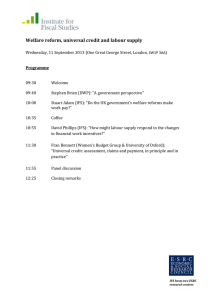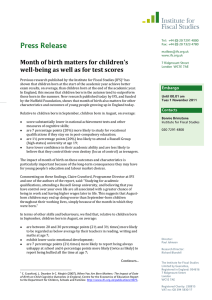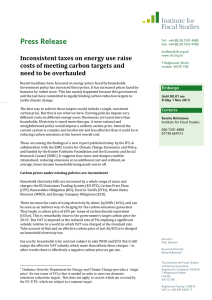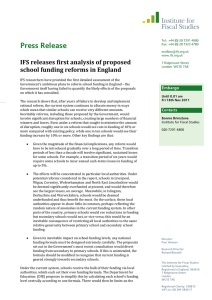Press Release
advertisement
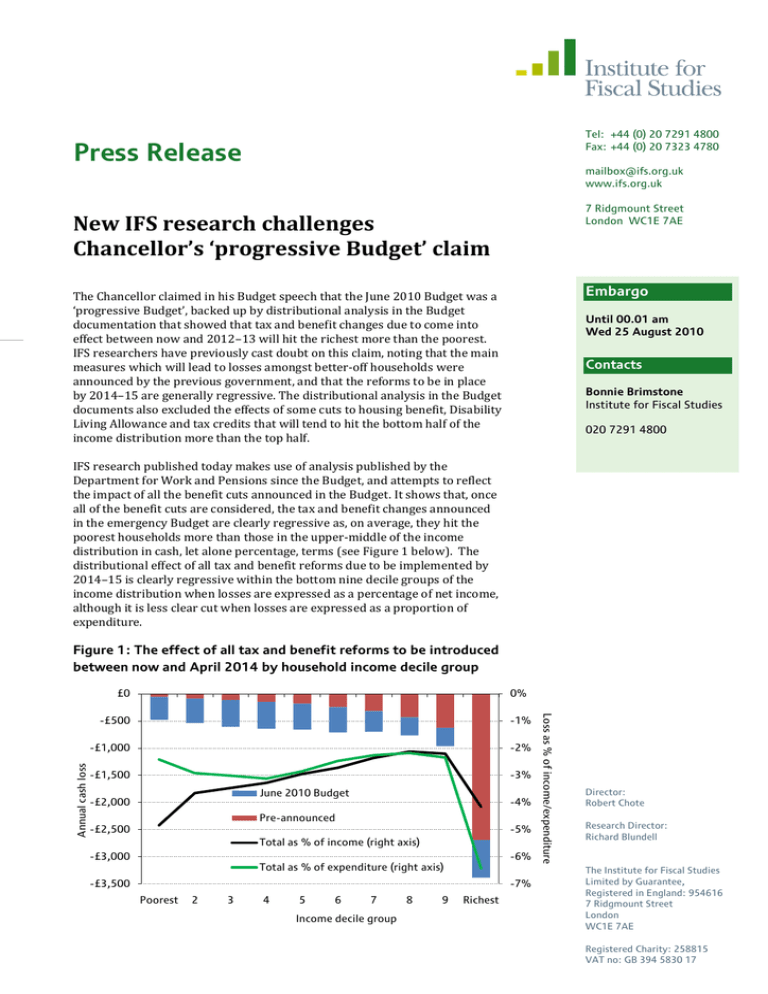
Tel: +44 (0) 20 7291 4800 Fax: +44 (0) 20 7323 4780 Press Release mailbox@ifs.org.uk www.ifs.org.uk 7 Ridgmount Street London WC1E 7AE New IFS research challenges Chancellor’s ‘progressive Budget’ claim Embargo The Chancellor claimed in his Budget speech that the June 2010 Budget was a ‘progressive Budget’, backed up by distributional analysis in the Budget documentation that showed that tax and benefit changes due to come into effect between now and 2012–13 will hit the richest more than the poorest. IFS researchers have previously cast doubt on this claim, noting that the main measures which will lead to losses amongst better-off households were announced by the previous government, and that the reforms to be in place by 2014–15 are generally regressive. The distributional analysis in the Budget documents also excluded the effects of some cuts to housing benefit, Disability Living Allowance and tax credits that will tend to hit the bottom half of the income distribution more than the top half. Until 00.01 am Wed 25 August 2010 Contacts Bonnie Brimstone Institute for Fiscal Studies 020 7291 4800 IFS research published today makes use of analysis published by the Department for Work and Pensions since the Budget, and attempts to reflect the impact of all the benefit cuts announced in the Budget. It shows that, once all of the benefit cuts are considered, the tax and benefit changes announced in the emergency Budget are clearly regressive as, on average, they hit the poorest households more than those in the upper-middle of the income distribution in cash, let alone percentage, terms (see Figure 1 below). The distributional effect of all tax and benefit reforms due to be implemented by 2014–15 is clearly regressive within the bottom nine decile groups of the income distribution when losses are expressed as a percentage of net income, although it is less clear cut when losses are expressed as a proportion of expenditure. Figure 1: The effect of all tax and benefit reforms to be introduced between now and April 2014 by household income decile group 0% -£500 -1% -£1,000 -2% -£1,500 -3% June 2010 Budget -£2,000 -4% Pre-announced -£2,500 -5% Total as % of income (right axis) -£3,000 -6% Total as % of expenditure (right axis) -£3,500 -7% Poorest 2 3 4 5 6 7 Income decile group 8 9 Richest Loss as % of income/expenditure Annual cash loss £0 Director: Robert Chote Research Director: Richard Blundell The Institute for Fiscal Studies Limited by Guarantee, Registered in England: 954616 7 Ridgmount Street London WC1E 7AE Registered Charity: 258815 VAT no: GB 394 5830 17 The report also considers the impact of tax and benefit reforms on different sorts of households (see Figure 2 below). Low-income households of working age lose the most as a proportion of income from the tax and benefit reforms announced in the emergency Budget. Those who lose the least are households of working age without children in the upper half of the income distribution. They do not lose out from cuts in welfare spending, and they are the biggest beneficiaries from the increase in the income tax personal allowance. Figure 2: The effect of tax and benefit reforms announced in the June 2010 Budget to be introduced by April 2014 by income decile group and household type Loss as a percentage of net income 0% -1% -2% -3% Families with children -4% Pensioners -5% Other -6% Poorest 2 3 4 5 6 7 8 9 Richest Income decile group The biggest single change to benefit policy in the June 2010 Budget in fiscal terms was the decision to link benefits with the Consumer Price Index (CPI) rather than the Retail Prices Index (RPI) or Rossi index from April 2011. This is very likely to mean less generous benefits in the years ahead. The Government argued that the CPI is a better measure of inflation than the indices to which benefits are currently linked because the way it is calculated allows for the fact consumers are able to protect themselves from price changes by substituting towards relatively cheaper goods, and because the goods and services it covers better reflect the "inflation experience" of households receiving benefits. We find the first of these arguments to be sound but the second to be more questionable – only 23% of benefit claimants are unaffected by increases in mortgage interest payments and council tax, which are the main items that are excluded from the CPI but included in the RPI. ENDS Notes to Editors: 1. 2. ‘The distributional effect of tax and benefit reforms to be introduced between June 2010 and April 2014: a revised assessment’ by James Browne th and Peter Levell will be published on Wednesday 25 August. This research was funded by the End Child Poverty campaign and the Economic and Social Research Council through the Centre for the Microeconomic Analysis of Public Policy at the IFS. For embargoed copies of the report or other queries, contact: Bonnie Brimstone at IFS: 020 7291 4800, bonnie_b@ifs.org.uk The report will be available on the IFS website from Wednesday 25 August: www.ifs.org.uk The Institute for Fiscal Studies Limited by Guarantee, Registered in England: 954616 7 Ridgmount Street London WC1E 7AE
